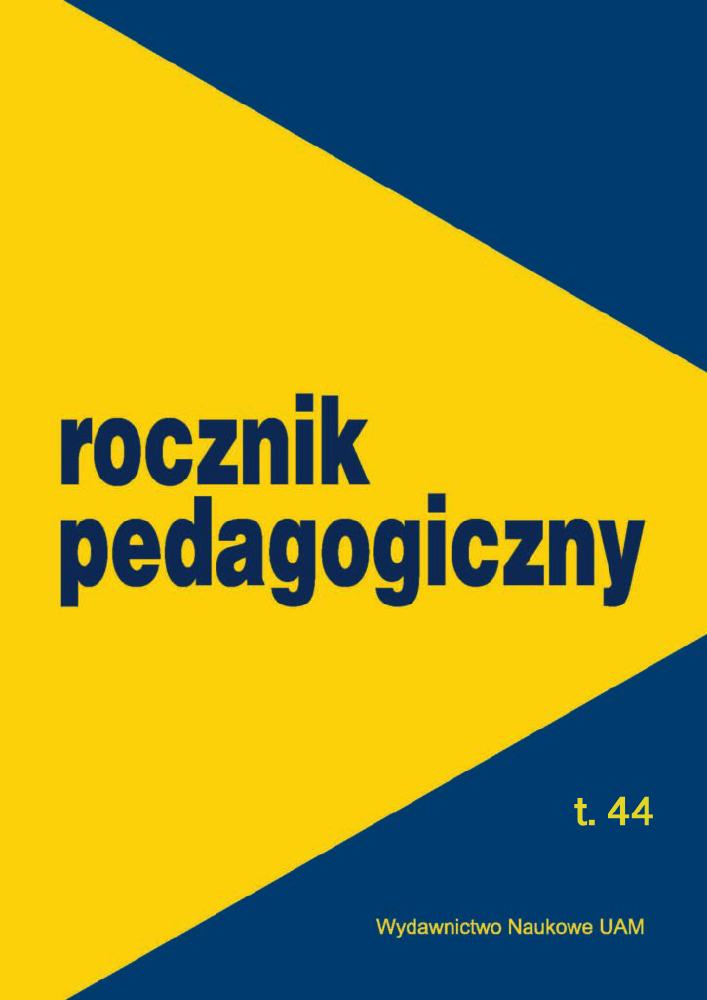Abstrakt
Students, parents, teachers and researchers in the field of education disagree with each other about the contribution of homework in the overall student learning process. In particular, widespread criti- cism is directed at the emotional and cognitive load that homework imposes on the student, the con- siderable time they consume, and the disruption caused, according to the claim, to the social devel- opment of the student. This claim is supported by a series of empirical studies that have been carried out for decades, especially recently, in the world and in Israel. Nevertheless, the role that homework plays in the student learning process and their impact on other components of the student’s learning experience has never been studied in Arabic-speaking schools in the country.
Bibliografia
Abu-Saad I., Arab Education in Israel: Issues and Dilemmas, “Alnebras” 2009, 5, 21–52 (Hebrew). Abu-Saad I., State-Controlled Education and Identity Formation Among the Palestinian Arab Minority in Israel, “American Behavioral Scientist” 2006, 49.8, 1085–1100.
Alhaj M., Preparation of Curricula in the Arab Education System in Israel: Changes and Recommendations, Floersheimer Institute for Policy Studies, Jerusalem 1994 (Hebrew).
Aloni N., Homework – It Is Possible Differently, Hebrew Psychology Website, 2004, [online] https://www.hebpsy.net/articles.asp?id=348 [accessed: 26.06.2020] (Hebrew).
Alonso-Tapia J., & Pardo A., Assessment of Learning Environment Motivational Quality from of Point of View of Secondary and High School Learners, “Learning and Instruction” 2006, 16, 295–309.
Ames C., Classrooms: Goals, Structures, and Student Motivation, “Journal of Educational Psychology” 1992, 84, 261–271.
Anderman E.M., Maehr M.L., & Midgley C., Declining Motivation after the Transition to Middle School: Schools Can Make a Difference, “Journal of Research and Development in Education" 1999, 32, 131–147.
Azulay Y., Ashkenazi A., Gabrielov L., Levi-Mazloum D., & Ben Dov R., Facts and Figures in the Education System of Israel, Jerusalem 2013.
Baker D., & LeTendre G.K., National Differences, Global Similarities, Stanford University Press, Stanford 2005.
Barak Stein H., Motivation – To Strengthen the Desire, to Achieve Goals, Hebrew Psychology Website, 2013, [online] http://www.hebpsy.net/community.asp?id=93&cat=article&articleid=2506> [accessed: 26.06.2020] (Hebrew).
Chen C., & Stevenson H.W., Homework: A Cross-Cultural Examination, “Child Development” 1989, 60, 551–561.
Cooper H., Synthesis of Research on Homework, “Educational Leadership” 1989, 47 (3), 85–91. Cooper H., Lindsay J.J., & Nye B., Homework in the Home: How Student, Family, and Parenting-Style Differences Relate to the Homework Process, “Contemporary Educational Psychology” 2000, 25, 464–487.
Cooper H., Lindsay J.J., Nye B., & Greathouse S., Relationships Among Attitudes about Homework, Amount of Homework Assigned and Completed, and Student Achievement, “Journal of Educational Psychology” 1998, 90, 70–83.
Cooper H., Robinson J.C., & Patall E.A., Does Homework Improve Academic Achievement? A Synthesis of Research, 1987–2003, “Review of Educational Research” 2006, 76, 1–62.
Coutts P.M., Meanings of Homework and Implications for Practice, “Theory into Practice” 2004, 43, 182–187.
Eccles J.S., Midgley C., Wigfield A., Buchanan C.M., Reuman D., Flanagan C., et al., Development during Adolescence: The Impact of Stage-Environment Fit on Young Adolescents’ Experiences in Schools and in Families, “American Psychologist” 1993, 48, 90–101.
Epstein J.L., & Voorhis Van F.L., More Than Minutes: Teachers ́ Roles in Designing Homework, “Educational Psychologist” 2000, 36 (3), 181–193.
Eren O., & Henderson D.J., Are We Wasting Our Children’s Time by Giving Them More Homework?, “Economics of Education Review” 2011, 30 (5), 950–961.
Golan-Agnon D., Why Are the Arab Students Discriminated against in Israel?, [in:] D. Golan-Agnon (ed.), Inequality in Education, Babel Press, Tel Aviv 2004, 70–89 (Hebrew).
Kaplan A. & Asor A., Motivation to learn in school – Practically speaking. The Education of Thinking 2.0, Jerusalem 2001.
Kohn A., The Homework Myth: Why Our Kids Get Too Much of a Bad Thing, Da Capo Press, Phi- ladelphia, PA 2006.
Maehr M.L., & Midgley C., Enhancing Student Motivation: A Schoolwide Approach, “Educational Psychologist” 1991, 26, 399–427.
Midgley C. (ed.), Goals, Goal Structures and Patterns of Adaptive Learning, Lawrence Erlbaum, Mahwah, NJ 2002.
Painter L., Homework, Oxford University Press, Oxford 2003.
Schunk D.H., Metacognition, Self-Regulation, and Self-Regulated Learning: Research Recommendations, “Educational Psychology Review” 2008, 20 (4), 463–467.
State of Israel, State Education Law, Ministry of Education Website, [online] http://cms.education.gov.il [accessed: 26.06.2020] (Hebrew).
Vatterott C., Rethinking Homework: Best Practices That Support Diverse Needs, ASCD, Alexandria, VA 2009.
Warton P.M., The Forgotten Voices in Homework: Views of Students, “Educational Psychologist” 2001, 36, 155–165.
